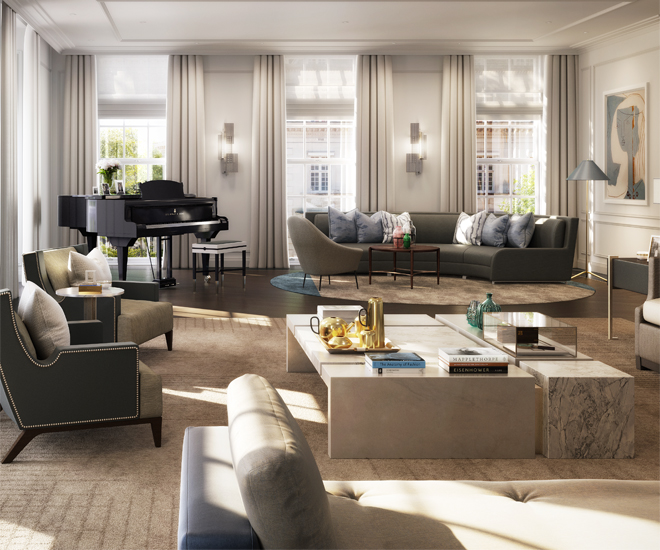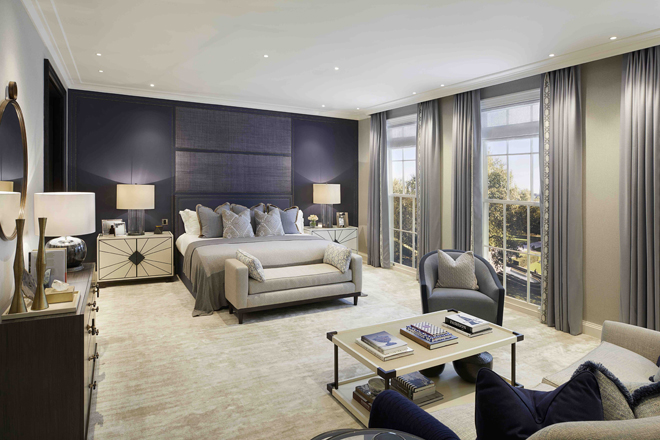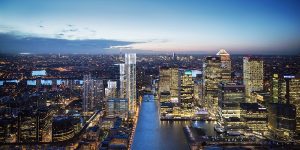Twenty Grosvenor Square: Mayfair London Top Luxury Development
20 Grosvenor Square in London will be Four Seasons first purely residential project, with pricey luxury apartments and no hotel rooms.

A drive and drop like the one offered at Twenty Grosvenor Square, is a first for a Mayfair development
Twenty Grosvenor Square, is not just Mayfair London’s first standalone Four Seasons Private Residences, it is Europe’s. Typically, a Four Seasons Private Residence comes with a hotel development attached, but for Twenty Grosvenor Square (20 GS for fans of hipster abbreviations), this London luxury development, located on one of the world’s grandest garden squares, Twenty Grosvenor Square is expected to become London’s top luxury development. The 37 private residence (including three penthouses) is expected to be completed in 2018. Finchatton, the developer and designer of this exquisite piece of heritage luxury real estate took bids from the world’s top hotel management groups before settling on service standards beyond reproach of the legendary Four Seasons. As a result, life at Twenty Grosvenor Square is expected to deliver unrivalled excellence and elegance.
In addition to being the company’s first residential project that is not integrated with a hotel, Twenty Grosvenor Square, a Four Seasons Residence will also be the company’s third property in London, joining Four Seasons Hotel London at Park Lane and Four Seasons Hotel London at Ten Trinity Square.
Alex Michelin of Finchatton has been a luxury property developer in the prime central London area for close to 20 years, and the products he delivers is Mayfair, Knightsbridge, or what luxury real estate developers call the “Golden Triangle” – the majority of his properties are £5 million plus or £5,000 psf plus – suffice it to say Michelin’s developments are extremely top end and as a result, highly confidential and the last thing a company would like to talk about in the press is a sensationalised news story like an Omani Sheikh forking top dollar for two slices of prime London real estate.

Each apartment, with prices starting £35 million, the interiors have been elegantly designed by Finchatton to offer three, four and five bedroom apartments, each conceived with luxurious design features such as elegant classical drawing rooms, soaring ceilings, media rooms, family and catering kitchens, and separate access for staff.
Since 2001, Finchatton has designed, managed and financed over 60 development projects worth more than £1 billion in not just UK addresses but also France, America, Switzerland, the Caribbean, the Middle East and Australasia. That’s not even counting the projects for its bespoke arm, Finchatton Private which has completed over 75 prestigious bespoke developments. Combined, the company has in excess of £1.3 billion in the pipeline.
Strict confidentiality is a requirement, especially with clientele from China where the government crackdown on capital outflows has been particularly harsh. At the invitation of Knight Frank, LUXUO had the privilege of sitting down with Alex Michelin, CEO and co-founder of Finchatton to discuss the prime London real estate, market forecasts and of course, the official launch of his new luxury London development – Twenty Grovsenor Square.

This London luxury development, located on one of the world’s grandest garden squares, Twenty Grosvenor Square is expected to become London’s top luxury development.
Alex Michelin of Finchatton on Twenty Grosvenor Square and London Luxury Real Estate Market
Alex, your known in the industry for both investment banking and property development, what do you foresee as the biggest opportunities in the sectors at the moment?
When it comes to property there’s been a lot of talk of Brexit, and I think it’s a little overblown. While it’s a storm in a teacup, I don’t think London will lose its place in the world as a leading financial centre nor will it stop being the capital of Europe. As a property developer, I see the Brexit debate and the market softening for land as a good opportunity to enter the market. I think what might be more relevant for LUXUO’s readership is that the relative weakness of the GBP versus the USD will be a great opportunity in that they can purchase something in London at 20-40% off (depending on what and where you buy) because of the dollar parity and the uncertainty. As Warren Buffet often says, buy when everyone is running for the exits and you have that moment now. For Finchatton, it’s a huge opportunity and we intend to purchase more assets over the next 12 months.
Just to clarify, you mentioned London as the capital of Europe, in what terms?
London is the capital of Europe in terms of amount of money flowing through the financial system, the culture, heritage, history and education – it’s where everyone wants to go. We’ve been very fortunate that we’ve been a magnet for the brightest minds in Europe. There has been net migration out of Paris and Germany to come here. In both the financial and property sector, we have the brightest minds in all of those countries – there’s a lot of well paying jobs, opportunity and a lot of capital flowing. All the venture capitalists are there and any of the ideas you need to get funded, London has all of that. I genuinely do not think that London is going to lose its place as the financial centre of Europe. It’s just too big, there’s too much history and the network of services is just too deep – it will take generations for all of this to go somewhere else.

From in-residence dining and catering, to concierge services, housekeeping, salon and spa services, grocery stocking, event planning, childcare, pet care, and transportation and business services, the seamless services of Twenty Grosvenor Square will be personally tailored to the lifestyle of each resident, offering ultimate customisation and peace of mind.
Does the rise of cryptocurrencies and the spurt of crypto-millionaires factor into this confluence?
Not really. Bitcoin and Ethereum have been fabulously successful and I believe that their valuations, debatable, are possibly in a bubble. We will see these technologies become more ingrained in the sector as they’re perfectly suited to property thanks to the distributed ledger which allows every single transaction there has ever been to be on everyone’s computer so everyone can track what has happened, which I believe will be phenomenal for the industry. The UK registry is looking to adopting some sort of blockchain technology but what’s interesting is that a few people have put their properties on the market and are ready to accept Bitcoin as a means of currency, it’s definitely the first in London – one of them is on the market for GBP 17 million and he’s saying he’ll accept Bitcoin. I’m not sure how this will happen but we will see how it will work.
Is 20 Grosvenor Square accepting Bitcoin?
We are not. We are worried about the speculative nature of the currency and there are still questions about what is has been used for, the source of funds and we don’t generally want to get into that debate, We try to be whiter than white and we make sure we know exactly where the funds are from and there are no money laundering threats or risks. There are UK regulations pertaining to money laundering and potential criminal activity and we need to track and trace and prove where the money is coming from thus people who accept bitcoin could open themselves up to those sort of legal challenges.

Monthly service rates at £14 psf are lower than what is typically expected of a high end luxury development of this nature with hotel servicing (usually £20), that’s because Twenty Grosvenor Square was built efficiently and certain functions like the doormen doubling as valets provide great value.
I’m trying to get a gauge of London real estate development and London property prices. To use a Singaporean example, developers are forking out top dollar here in a phenomenon known as “en-bloc sales” – this means that whatever they build, they have to factor into PSF costs to recoup their aggressive land bids leading to concerns that the property might have inflated rather than real values, is this something which happens over the pond as well?
Ian Pidgeon, Knight Frank, Partner, Joint Head Prime New Homes Residential Development: I don’t think as much, London is a very old market, a lot of the buildings are listed within conservation areas and so you cant simply knock a building down and build a tower. The scarcity of land will make it very hard to get a good location, the planning laws are very restrictive as well – as a result, we couldn’t build a tower for Twenty Grovesnor Square while retaining the historical facade as well.
Michelin: You already know what you have to pay for the land, that said, there are definitely developers who outbid and overpay and prices get out of control but we definitely didn’t do that for 20 Grosvenor Square.
Pidgeon: It’s also very difficult to get permission for change of use and a majority of Mayfair are commercial, that is to say, retail or offices thus to switch from that to residential is very hard. Thus what’s been developed now in Mayfair is pretty much it and therefore supply is pretty tight.

What were some of the complexities in developing a historical building like the US Naval Headquarters into 20 Grosvenor Square?
They were there since 1939 as part of the war effort and we were lucky in that anything of historical value was taken down when they departed in 2007, thus we were able to demolish everything with the exception of the facade which gave us a unique position which is part of London’s heritage and yet have the latest technology and the most advanced building methodologies giving our apartments incredible acoustics, sound proofing, water pressure and heating etc, are all absolutely 21st century while a lot of buildings particularly those on Eaton Square are struggling to get the same level of quality as a lot of history has to be maintained.
Ned Baring, Director, Savills Private Office: I think one of the most important things about 20 Grovesnor Square is that it’s the first residential development in Mayfair serviced by a hotel. Mayfair hasn’t seen any developments for a long time and this is the first multi unit scheme in best address in Mayfair, It’s like Monopoly where if you parked on Mayfair and Parklane, you literally end up winning the whole game, luckily Alex and Andrew won the game by building basically the best London residential development i’ve ever seen.

Once the home of the US Naval Forces in Europe and frequented by the likes of General Dwight Eisenhower during the Second World War, Twenty Grosvenor Square is steeped with rich history. Reviving the energy of the original building
An Omani Sheikh just forked out GBP25 million for two apartments near Harrods, do outliers like these spike property evaluations unnecessarily?
Baring: The London real estate market has always typically seen strong PSFs ever since 199 The Knightsbridge got built and we’ve seen growth from £1,000 to £2,000 and now even £8,000 in some luxury developments and 20 Grosvenor Square comes close to it and we’re seeing wealth coming in from all four corners of the globe. It used to be that you’d build something and expect Russians to come rushing in but now you can’t actually finger point to which nationality is coming into London. Global wealth has gotten bigger and there are more billionaires being made everyday thus the wealth coming into a very small country is obscene.
Michelin: Since the 1900s, London has always been very global as a city and a foreigner’s enclave, particularly as the world has gotten smaller, Singapore has become more international as well over the years.
Baring: Most importantly, the English are very desirous of 20 Grosvenor Square which is a huge flag on the map because a lot of these foreign money types come in for two months of the year and it’s really refreshing to see proper English wealth come in and buy 20 Grosvenor Square.
- The Museum of Modern Art, The Museum of Contemporary Art in Tokyo, The Art Institute of Chicago and The Museum of Contemporary Art in Los Angeles.
- & Sciences (Emmy® Awards), Communication Arts, The Art Directors Club, World Luxury Award, American Design Awards, and The International Property Awards, and has been exhibited at
- DBOX’s work has been recognised by organisations including the Academy of Television Arts
- & Sciences (Emmy® Awards), Communication Arts, The Art Directors Club, World Luxury Award, American Design Awards, and The International Property Awards, and has been exhibited at
- DBOX’s work has been recognised by organisations including the Academy of Television Arts
Michelin: To your point about value, London is very old market and we have great systems, we have a lot of information about everything that sells, we have lots of providers providing data on everything which sales, a multitude of variables, so we have very good data. Thus, when people want to buy into London real estate and they ask how we have priced it or why it is priced at this level, we can give them 50 comparable points of data and show them what everything else has sold for that time period and location and even confirm at the Land Registry. London is not a market where value is plucked from the air, there’s a lot of historical data which backs how things have trended and where the market has been. When Knight Frank and Savills price something like Twenty Grosvenor Square, they know that’s the market demand give or take 5%.
Baring: There are 17 different nationalities but the English have been predominant in the purchase of units at Twenty Grosvenor Square.
More often than not, we hear about the Middle Easterns and the Russians buying into London, is there a media bias because the reportage seem to be make it appear that few English are buying?
Pidgeon: It’s completely global, we do a run of three to four sales to them but there’s always something from different pockets in the world buying into London. Where there’s education, we are doing more sales to Chinese buyers where their children are going to boarding schools in London and so supply and demand are shaping a lot of the pricing and so if you want a blue chip location – typically, Mayfair, Belgravia, Knightsbridge, it’s where the old money has always been. Even then, if you came in with £20 million and say show me the best, we’d be struggling to show you more than 2 or 3 which tick all the right boxes. These people who buy into these exclusive areas typically don’t sell and buy again, so these are long term holds. Maybe some of the other areas are a little more speculative, along the river, that’s more pure investor driven. When you come into Mayfair, these are for discretionary individuals who want the very best. They pay those prices because they know that if you don’t want it, somebody else will.

Bringing the luxuries and conveniences of hotel living home, Twenty Grosvenor Square, a Four Seasons Residence will offer the many services and amenities that guests enjoy in Four Seasons hotels and resorts around the world.
Michelin: There’s definitely a bias. We keep a lot of what we do very confidential, it doesn’t suit our interest to publicise too much what goes on in our market but the media will always latch on to some gossip or a juicy headline which screams Russian oligarch or Middle Eastern Sheikh, they latch on that but really we have a ready market of British buyers but this doesn’t make a story or headline. Media in London is very sensationalist, they don’t want to write “The English just bought 60% of apartments in London last year”.
Baring: We typically get a lot of Middle Eastern interest but the events unfolding in Qatar have weakened demand from that region at the moment. Chinese buyers are picking up and this is quite new – we’ve always had Singapore and Hong Kong but not as many from China over the last 10 years and it’s just beginning but this is going to be a long process as they first have to figure out how to get money out of the country, it’s a lot of education to tell them how to purchase and there’s a lot of purchasing power waiting to be harnessed.
Michelin: To answer your question, yes, the British are still predominant. 38-40% comprise Middle East, China, Russia, East Asia and the rest of Europe. Everyone. There’s a joke that pretty much anyone who has a billion dollars, owns a flat in London. It’s just one of those places where you want to own a property.

One Hyde Park, Knightsbridge
What’s your forecast on London and what prime new build and investment projects do you foresee?
Michelin: We are looking to purchase more assets now because opportunities abound due to the uncertainty over Brexit. Essentially everyone will realise life still goes on and that London is still the place to be, prices will once again rebound and thus we’re very confident investing in London and our intention is to continue to do so, we are not going to start investing in other places which other people seem to be doing.
Pidgeon: Ned and I have been flying and seeing the buyers and the general sentiment and consensus is that they’re not spooked by Brexit, they simply want to buy the best and they’re in no great rush. London real estate is going to stay pretty flat over the next two years and they pretty much see that the opportunity to buy into London is now thanks to the exchange rate as well as the relative lack of supply, which isn’t going to change much over the next five years. We have identified pretty much every single London Luxury Development which has been going on, the people we are talking to are comfortable and they are expecting things to bounce back in the next 2-3 years. Stamp duty rather than Brexit is slowing the market down and causing some values to drop.
Baring: Purchasing in London is still a lot cheaper than purchasing in New York or Hong Kong, as much as restrictions have cooled the market, it hasn’t stopped the market.
Knightsbridge is home to your development, One Hyde Park, does this sort of exuberance bode well for the area or does it contribute to a potential bubble?
Baring: Historically, Knightsbridge was never a destination to go and live, you’d typically choose to live in Belgravia or Mayfair, People will go to Knightsbridge to shop, eat there and then they will drive home because the preference is to live in Mayfair. Mayfair really is the number one destination to live in London. That said, recent high profile new developments are putting Knightsbridge on the map for London.
Pidgeon: One Hyde Park and 199 The Knightsbridge stole the headlines because they had parking and quality amenities. Mayfair had lagged behind for a bit but now the area is by far, the destination but truth was supply hadn’t really been there 10 years ago.
Michelin: Mayfair historically has always been the number one place to live in London. The Duke of Westminster built Mayfair built Grosvenor Square specifically for the great and the good. Mayfair has historically been home for the most powerful and wealthy politicians globally. All that has happened over time is that it’s been very difficult to build a brand new shiny tower over there. Knightsbridge had old buildings which made it ripe for redevelopment and swanky new luxury apartments with hotel servicing. It was product led rather than location led. It’s so difficult to do something like that in Mayfair simply because there’s so much history and heritage that it was a coup to do Twenty Grosvenor Square. Knightsbridge stole all the headlines from Mayfair for a time and I dare say it has swung back to Mayfair. It has the highest number of Michelin star restaurants and by far, the most high end boutiques and the best hotels. Mayfair is the place. Twenty Grosvenor Square is the pinnacle of everything that has been created in London.
















